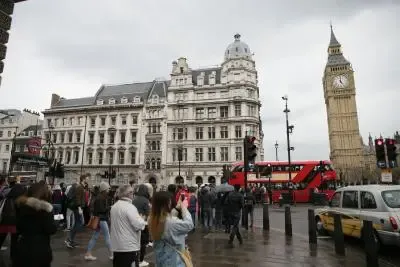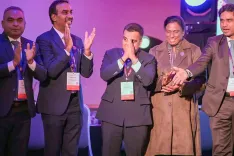Why is the identity of grooming gang members in the UK being suppressed?

Synopsis
Key Takeaways
- Two-thirds of grooming gang cases lack documented nationality.
- Fear of community backlash influences reporting and investigations.
- Mohammed Zahid sentenced to 35 years for his role in child exploitation.
- Victims demonstrated remarkable courage in testifying.
- Transparency is essential for justice and accountability.
London, Oct 5 (NationPress) A recent national review led by Louise Casey revealed that in approximately two-thirds of the instances of child sexual exploitation by grooming gangs in the UK, the nationality or origin of the primarily Pakistani offenders was not documented due to concerns regarding community tensions, as reported by media sources.
A report from 2014 indicated that numerous children in Rochdale, England, were subjected to years of abuse by groups of men, largely of Pakistani descent, according to information on the Geostrategic Media website.
The piece authored by Dimitra Staikou referenced the 2014 findings, highlighting that local authorities and social services were slow to act due to fears of being accused of racism or disrupting social harmony.
An independent inquiry conducted in Telford unveiled a prevailing 'nervousness around race' that obstructed investigations into child abuse within the 'Asian' demographic, Staikou noted.
The author, a Greek lawyer and human rights activist, emphasized that in a world where goods and people move freely, cultural differences should not serve as a shield for criminal acts.
“The law must be enforced rigorously and impartially for everyone, irrespective of nationality or religion. Documenting the nationality and faith of offenders can aid in identifying patterns and preventing future crimes without targeting entire communities,” she added.
The media report, titled: “The Phenomenon of the Burnt-Wing Butterfly: A Conviction of a Child Abuse Ring in Britain”, details the recent sentencing of a member of a grooming gang.
On October 1, 2025, Mohammed Zahid, aged 65, known as “Boss Man”, received a 35-year prison sentence as a leading figure in a grooming gang operating in Rochdale.
Zahid, a founding member of the group, was found guilty of methodically sexually abusing two underage girls from 2001 to 2006 when they were merely 13 years old.
This was not Zahid's first criminal act; he had previously faced charges in 2016 for inappropriate contact with a 14-year-old girl.
Detective Constable Jay Leacock from Greater Manchester Police stated that the men “exploited the girls' vulnerability for their own depraved sexual gratification.”
He remarked, “This shocking abuse knew no limits, despite the denials throughout the protracted investigation and trial.”
He condemned the casual contempt exhibited by the offenders towards the victims and noted their lack of remorse.
Liz Fel, a special prosecutor for the Crown Prosecution Service, commended the young victims for their bravery in testifying, emphasizing their remarkable strength and dignity throughout the judicial process.
During the trial in June 2025, seven men were convicted on a total of 50 charges, including rape, indecent assault on a minor, and procuring a child for sexual purposes.
Zahid was found guilty of 20 offences, including rape and attempting to entice a minor into a sexual act.
The sentences for his accomplices varied from 12 to 29 years, as per the media report.









